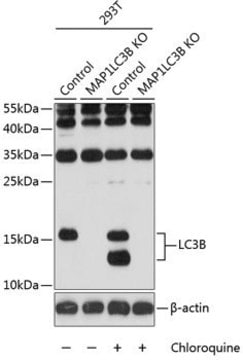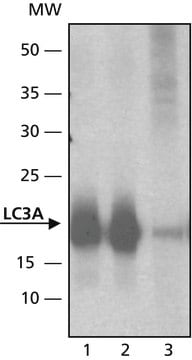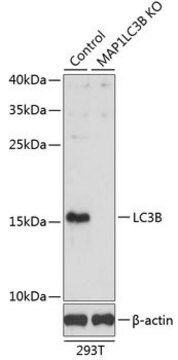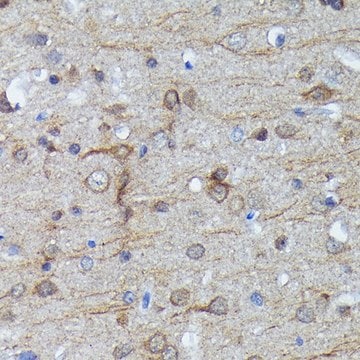L7543
Anti-LC3B antibody produced in rabbit

~1 mg/mL, affinity isolated antibody, buffered aqueous solution
Synonym(s):
LC3B Antibody - Anti-LC3B antibody produced in rabbit, Lc3 Antibody Sigma, Lc3B Antibody, Anti-Autophagy-related protein LC3 B, Anti-Autophagy-related ubiquitin-like modifier LC3 B, Anti-MAP1 light chain 3-like protein 2, Anti-MAP1A/1B light chain 3 B, Anti-MAP1A/MAP1B LC3 B, Anti-Microtubule-associated proteins 1A/B light chain 3B precursor
About This Item
Recommended Products
biological source
rabbit
conjugate
unconjugated
antibody form
affinity isolated antibody
antibody product type
primary antibodies
clone
polyclonal
form
buffered aqueous solution
mol wt
antigen 16-18 kDa
species reactivity
mouse, human, rat
enhanced validation
functional assay
Learn more about Antibody Enhanced Validation
concentration
~1 mg/mL
technique(s)
indirect immunofluorescence: 5-10 μg/mL using human HeLa cells
western blot: 1-2 μg/mL using whole extracts of rat and mouse brain
UniProt accession no.
application(s)
research pathology
shipped in
dry ice
storage temp.
−20°C
target post-translational modification
unmodified
Gene Information
human ... MAP1LC3B(81631)
mouse ... Map1lc3b(67443)
rat ... Map1lc3b(64862)
General description
Specificity
Immunogen
Application
Biochem/physiol Actions
Physical form
Disclaimer
Not finding the right product?
Try our Product Selector Tool.
Storage Class Code
10 - Combustible liquids
WGK
WGK 1
Personal Protective Equipment
Certificates of Analysis (COA)
Search for Certificates of Analysis (COA) by entering the products Lot/Batch Number. Lot and Batch Numbers can be found on a product’s label following the words ‘Lot’ or ‘Batch’.
Already Own This Product?
Find documentation for the products that you have recently purchased in the Document Library.
Customers Also Viewed
Our team of scientists has experience in all areas of research including Life Science, Material Science, Chemical Synthesis, Chromatography, Analytical and many others.
Contact Technical Service














